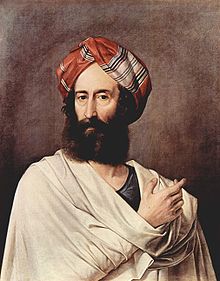| Revision as of 21:27, 1 October 2006 editTherealmikelvee (talk | contribs)726 edits Reverted what would technically be considered vandalism.← Previous edit | Revision as of 20:51, 2 October 2006 edit undoHumus sapiens (talk | contribs)27,653 edits RV Therealmikelvee. see WP:NPOV#Undue weightNext edit → | ||
| Line 6: | Line 6: | ||
| ==Biography== | ==Biography== | ||
| The second son of ], born in ] (Gen. 41:52; 46:20). The first incident recorded regarding him is his being placed, along with his brother ], before their grandfather, ], so that Jacob might bless them (48:10; comp. 27:1). The intention of Joseph was that the right hand of the aged patriarch should be placed on the head of the elder of the two; but Jacob set Ephraim the younger before his brother, "guiding his hands wittingly." Before Joseph's death, Ephraim's family had reached the third generation (Gen. 50:23). | The second son of ], born in ] (Gen. 41:52; 46:20). The first incident recorded regarding him is his being placed, along with his brother ], before their grandfather, ], so that Jacob might bless them (48:10; comp. 27:1). The intention of Joseph was that the right hand of the aged patriarch should be placed on the head of the elder of the two; but Jacob set Ephraim the younger before his brother, "guiding his hands wittingly." Before Joseph's death, Ephraim's family had reached the third generation (Gen. 50:23). | ||
| An Egyptian writer--]--has claimed that Ephraim may be identified with Pharaoh ], who is thought by some scholars to be a son of ], a powerful court official under ]. Osman, in turn, thinks he may be identified as Joseph, the Pharaoh's Viceroy in the Bible. However, Ay's parentage--which has been the source of much speculation among Egyptologists--remains unknown from contemporary Egyptian records and Osman's claim is not followed by mainstream Egyptologists. The only thing that is certain is that Yuya was the father of Queen ], Amenhotep III's chief wife, and ], her older brother. Yet, very interestingly enough, Ephraim is said by Hebrew tradition to eventually rule Egypt as Pharaoh, but, although Egypt previously temporarily was made to worship the God of the ], Ephraim later allowed them to worship their previous gods and idols, which is ''exactly'' the case with ] (if there is a connection between ] and ]). | |||
| ==Descendants== | ==Descendants== | ||
Revision as of 20:51, 2 October 2006
This article is about the second son of Joseph. For other meanings, see Ephraim (disambiguation).
Ephraim (Hebrew: אֶפְרַיִם/אֶפְרָיִם, Standard Efráyim Tiberian ʾEp̄ráyim/ʾEp̄rāyim) – "double fruitfulness" ("for God had made him fruitful in the land of his affliction").
Biography
The second son of Joseph, born in Egypt (Gen. 41:52; 46:20). The first incident recorded regarding him is his being placed, along with his brother Manasseh, before their grandfather, Jacob, so that Jacob might bless them (48:10; comp. 27:1). The intention of Joseph was that the right hand of the aged patriarch should be placed on the head of the elder of the two; but Jacob set Ephraim the younger before his brother, "guiding his hands wittingly." Before Joseph's death, Ephraim's family had reached the third generation (Gen. 50:23).
Descendants
Ephraim's descendants were known as the Tribe of Ephraim.
See also
External links
References
 This article incorporates text from a publication now in the public domain: Easton, Matthew George (1897). Easton's Bible Dictionary (New and revised ed.). T. Nelson and Sons.
This article incorporates text from a publication now in the public domain: Easton, Matthew George (1897). Easton's Bible Dictionary (New and revised ed.). T. Nelson and Sons. {{cite encyclopedia}}: Missing or empty|title=(help)
This article related to the Hebrew Bible is a stub. You can help Misplaced Pages by expanding it. |